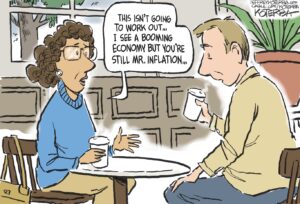What We Need Now: A National Economic Strategy for Better Jobs
Economic determinists -- fatalists, really -- assume that globalization and technological change must now condemn a large portion of the American workforce to under-unemployment and stagnant wages, while rewarding those with the best eductions and connections with ever higher wages and wealth.
This post originally ran on Robert Reich’s Web page.
Jobs are returning with depressing slowness, and most of the new jobs pay less than the jobs that were lost in the Great Recession.
Economic determinists — fatalists, really — assume that globalization and technological change must now condemn a large portion of the American workforce to under-unemployment and stagnant wages, while rewarding those with the best eductions and connections with ever higher wages and wealth. And therefore that the only way to get good jobs back and avoid widening inequality is to withdraw from the global economy and become neo-Luddites, destroying the new labor-saving technologies.
That’s dead wrong. Economic isolationism and neo-Ludditism would reduce everyone’s living standards. Most importantly, there are many ways to create good jobs and reduce inequality.
Other nations are doing it. Germany was generating higher real median wages until recently, before it was dragged down by austerity it imposed the European Union. Singapore and South Korea continue to do so. Chinese workers have been on a rapidly-rising tide of higher real wages for several decades. These nations are implementing national economic strategies to build good jobs and widespread prosperity. The United States is not.
Any why not? Both because we don’t have the political will to implement them, and we’re trapped in an ideological straightjacket that refuses to acknowledge the importance of such a strategy. The irony is we already have a national economic strategy but it’s been dictated largely by powerful global corporations and Wall Street. And, not surprisingly, rather than increase the jobs and wages of most Americans, that strategy has been increasing the global profits and stock prices of these giant corporations and Wall Street banks.
If we had a strategy designed to increase jobs and wages, what would it look like? For starters, it would focus on raising the productivity of all Americans through better education — including early-childhood education and near-free higher education. That would require a revolution in how we finance public education. It’s insane that half of K-12 budgets still come from local property taxes, for example, especially given that we’re segregating geographically by income. And it makes no sense to pay for the higher education of young people from middle and lower-income families through student debt; that’s resulted in a mountain of debt that can’t or won’t be paid off, and it assumes that higher education is a private investment rather than a public good.
It would also require greater accountability by all schools and universities for better outcomes — but not just better test results. The only sure thing standardized tests measure is the ability to take standardized tests. Yet the new economy demands problem-solving and original thinking, not standardized answers.
Better education would just be a start. We would also unionize low-wage service workers in order to give them bargaining power to get better wages. Such workers — mostly in big-box retailers, fast-food chains, hospitals, and hotel chains — aren’t exposed to global competition or endangered by labor-substituting technologies, yet their wages and working conditions are among the worst in the nation. And they represent among the fastest-growing of all job categories.
We would raise the minimum wage to half the median wage and expand the Earned Income Tax Credit. We’d also eliminate payroll taxes on the first $15,000 of income, making up the shortfall in Social Security by raising the cap on income subject to the payroll tax.
We’d also restructure the relationships between management and labor. We would require, for example, that companies give their workers shares of stock, and more voice in corporate decision making. And that companies spend at least 2% of their earnings upgrading the skills of their lower-wage workers.
We’d also condition government largesse to corporations on their agreement to help create more and better jobs. For example, we’d require that companies receiving government R&D funding do their R&D in the U.S.
We would prohibit companies from deducting the cost of executive compensation in excess of more than 100 times the median compensation of their employees or the employees of their contractors. And bar them from providing tax-free benefits to executives without providing such benefits to all their employees.
And we would turn the financial system back into a means for investing the nation’s savings rather than a casino for placing huge and risky bets that, when they go wrong, impose huge costs on everyone else.
There’s no magic bullet for regaining good jobs and no precise contours to what such a national economic strategy might be, but at the very least we should be having a robust discussion about it. Instead, economic determinists seem to have joined up with the free-market ideologues in preventing such a conversation from even beginning.
Robert B. Reich, chancellor’s professor of public policy at UC Berkeley, was secretary of labor in the Clinton administration. Time magazine named him one of the 10 most effective Cabinet secretaries of the last century. He has written 13 books, including the best-sellers “Aftershock” and “The Work of Nations.” His latest, “Beyond Outrage,” is now out in paperback. He is also a founding editor of The American Prospect magazine and chairman of Common Cause.
Your support matters…Independent journalism is under threat and overshadowed by heavily funded mainstream media.
You can help level the playing field. Become a member.
Your tax-deductible contribution keeps us digging beneath the headlines to give you thought-provoking, investigative reporting and analysis that unearths what's really happening- without compromise.
Give today to support our courageous, independent journalists.









You need to be a supporter to comment.
There are currently no responses to this article.
Be the first to respond.